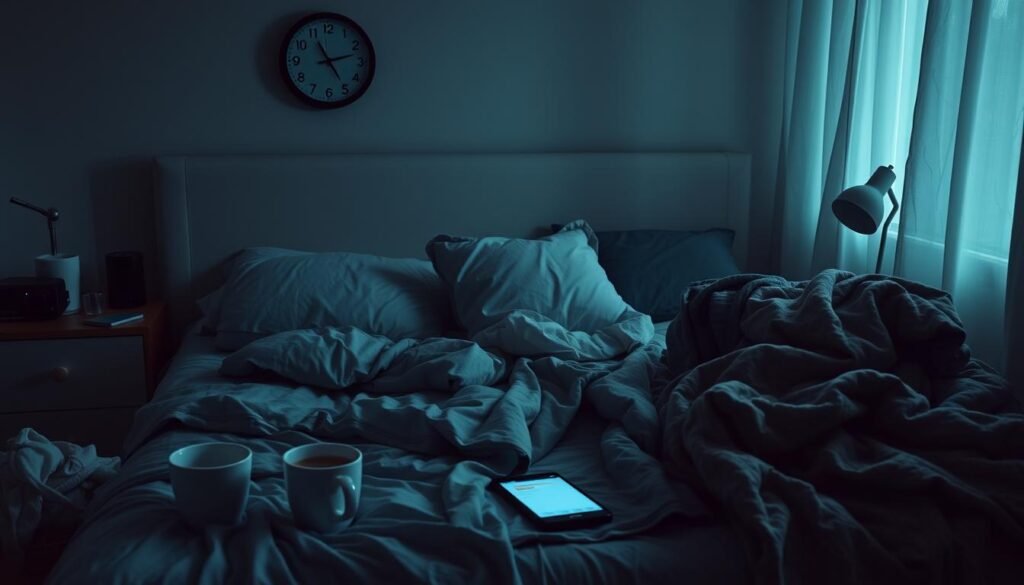Did you know a third of Americans don’t get seven hours of sleep each night? This problem is mainly because of long term insomnia. This condition makes it hard to fall or stay asleep for over three nights a week for three months. It can come from stress, health problems, and bad sleep habits. It’s important to find the cause to treat insomnia right.
Not sleeping well doesn’t just make you tired. It can cause big health problems. Emotional stress and health issues like breathing problems and diabetes are often linked. By understanding these connections, we can find the right solutions. Making changes in how we live can also help stop insomnia. Learning what causes long term insomnia is key to better sleep.
Key Takeaways
- Chronic insomnia affects at least 10% to 15% of the population.
- Stress and emotional factors are big reasons for long-term insomnia.
- Cognitive behavioral therapy works well for chronic insomnia.
- Health problems like diabetes and breathing issues can disturb sleep.
- Improving sleep habits and lifestyle changes can make sleep better.
Understanding Insomnia
Millions of people struggle with insomnia. It means they can’t start or keep sleeping. This leads to exhaustion and mood issues. There are different types of insomnia to know about.
Definition and Types of Insomnia
Knowing the types of insomnia is key to dealing with it. There are two main kinds: primary and secondary. Primary insomnia stands alone. Secondary insomnia is due to other health problems or stress. This difference shapes how it is treated and how recovery happens.
Acute vs. Chronic Insomnia
Acute insomnia is short-term. It can come from big life changes or stress, lasting days to weeks. On the other hand, chronic insomnia happens at least three times a week for three months or more. It really impacts daily life. Understanding the differences in chronic insomnia is crucial for finding the right treatment.
| Type of Insomnia | Duration | Causes | Typical Treatment |
|---|---|---|---|
| Acute Insomnia | A few days to weeks | Stress, life changes | Lifestyle changes, short-term medications |
| Chronic Insomnia | Three months or longer | Underlying health conditions, emotional issues | Behavioral therapy, long-term medications |
| Primary Insomnia | More than one month | Unrelated to other conditions | Behavioral interventions |
| Secondary Insomnia | Varied | Result of other factors (medical conditions, medications) | Treatment of underlying cause |
What Causes Long Term Insomnia
It’s essential to know why long-term insomnia happens. Many triggers exist for this widespread sleep issue. Stress and emotions are big factors in sleep quality. Stress-related insomnia comes from life’s challenges, blocking relaxation.
Emotions like anxiety and depression can also start a distress cycle. This makes sleep hard to come by.
Stress and Emotional Factors
Worries about work, health, or personal relationships impact sleep. Stressful events, such as loss or relationship problems, disrupt sleep. This constant worry can lead to long-lasting insomnia.
These stressors don’t just break sleep habits. They may turn into bigger health issues, causing fatigue and poor daytime functioning.
Medical Conditions Contributing to Insomnia
Insomnia links to various medical conditions. Asthma and COPD make sleeping hard. Diabetes, GERD, and heart problems also disturb sleep.
Psychological issues, like anxiety and depression, block good sleep too. Alzheimer’s disease patients can face even starker sleep challenges. Identifying these conditions is key for treating long-term insomnia.
| Condition | Impact on Sleep |
|---|---|
| Asthma | Breathing difficulties can disrupt sleep. |
| COPD | Chronic cough can hinder restful sleep. |
| Diabetes | Frequent urination and discomfort affect sleep quality. |
| GERD | Acid reflux can lead to nightly awakenings. |
| Anxiety | Persistent worrying affects ability to fall asleep. |
| Depression | Insomnia may be a symptom or a contributing factor. |
Impact of Chronic Sleep Deprivation
Chronic sleep deprivation significantly affects both mental and physical health. Understanding these impacts is crucial. It highlights the importance of managing sleep issues for well-being.
Mental Health Effects
Mental health suffers a lot from lack of sleep. Conditions like anxiety and depression can stem from it. Studies show that not getting enough sleep can make people less motivated and more irritable.
It also makes thinking clearly harder. When people can’t manage their emotions well, it makes their mental health worse. Not sleeping enough can make handling stress much harder, leading to bigger mental health issues.
Physical Health Consequences
The body also feels the bad effects of not sleeping enough. It can make you more likely to get serious health problems like obesity, diabetes, and heart diseases. Research says sleeping less than six hours a night can lead to high blood pressure.
It can also mess up how your body processes sugar and makes insulin. This increases the chance of getting type 2 diabetes. Not sleeping enough weakens the immune system too. This makes you get colds more often and slows down recovery from sickness.
In summary, not getting enough sleep can really hurt your mental and physical health. Dealing with sleep problems can make your life much better overall.
| Consequences of Chronic Sleep Deprivation | Mental Health Effects | Physical Health Consequences |
|---|---|---|
| Increased anxiety and depression | Loss of motivation | Higher risk of hypertension |
| Cognitive impairments | Irritability | Obesity risk increases |
| Emotional dysregulation | Memory challenges | Diabetes and cardiovascular risks |
| Difficulty in stress management | Psychiatric disturbances | Decreased immune function |
Lifestyle Factors Affecting Sleep
It’s key to know how lifestyle affects sleep. Bad sleep habits and insomnia often come from daily actions that mess with our body’s natural sleep-wake cycle. By being aware and making changes, we can sleep better.
Role of Sleep Habits
Good sleep habits are crucial for restful sleep. Problems like irregular sleep times, too much screen time, and doing energizing activities before bed are common. Setting a regular sleep schedule and cutting down distractions can help a lot.
Taking steps to fix bad sleep habits will improve your sleep. This can make a big difference in how you feel every day.
Effect of Physical Activity
Being active is great for sleep. Exercise helps sort out sleep patterns and calms the mind. Keeping up with regular workouts is good for the heart and helps with sleep.
But, try not to exercise too hard before bedtime. It might make it hard to wind down. Finding the right balance between exercise and rest can help if you’re dealing with insomnia.

Circadian Rhythm Disruption
Changing your body’s natural sleep cycle can make getting good sleep hard. If you travel a lot, especially to different time zones, you might get travel jet lag. This is common among frequent travelers. People who work different shifts also face trouble. They find it hard to keep a regular sleep schedule. It’s important to know about these problems to manage your sleep better.
Travel and Shift Work Impacts
Jet lag can feel worse when you fly east rather than west. It might take a day to adjust for each time zone you cross. Around one-third of workers deal with shift work. This can lead to ongoing sleep problems. Those with delayed sleep-wake phase disorder (DSWPD) find it hard to sleep at the usual times. This can affect their health and daily life.
Understanding the Body’s Internal Clock
The body’s internal clock helps control when we sleep and wake up. It uses light and dark to maintain this cycle. Getting sunlight can help keep our sleep patterns healthy. Sticking to a light exposure routine and maintaining sleep cleanliness can help adjust your clock. Doing regular exercise, eating meals at the right time, and avoiding caffeine can also help. These steps can lessen the impact of a messed-up sleep cycle.
Environmental Factors Influencing Sleep
Understanding how environmental factors impact sleep is key. Noise and light from our environments can disturb our sleep. By tackling these problems, we can improve our sleep and our overall health.
Noise and Light Disruptions
Environmental factors like noise are big reasons for sleep problems. People in cities deal with traffic noise and other loud sounds that interrupt their sleep. These noises can wake you up often, making your sleep worse. To help, creating a comfortable sleep environment is a must. Using sound machines or white noise can block out these noises. Blackout curtains can stop too much light from getting in. Taking these steps can really help us sleep better. You can find more info here.
Comfortable Sleeping Environment
The quality of your bedding, the temperature of your room, and how cozy your bedroom feels all play a part in good sleep. A comfortable sleep environment means the setting is just right for resting well. Choosing the best mattress, keeping the room at a good temperature, and using quality linens all make a difference. Also, living in places with lots of green spaces and areas to walk can boost sleep quality. People sleep better in neighborhoods that support a healthy lifestyle and being active. You can learn more about these factors here.

| Environmental Factor | Impact on Sleep | Management Strategies |
|---|---|---|
| Noise | Disrupts sleep cycles, contributes to awakenings | Sound machines, white noise, earplugs |
| Light | Interferes with natural sleep cues | Blackout curtains, sleep masks |
| Bedding Quality | Affects comfort and relaxation | High-quality mattress and linens |
| Room Temperature | Can impact sleep quality | Maintain a cool and comfortable climate |
| Neighborhood Environment | Affects overall sleep health | Access to green spaces, safe walking routes |
Medication Side Effects
Many people have trouble sleeping because of their medication’s side effects. Knowing which meds might cause insomnia helps deal with sleep problems. Some medicines, including those you can buy without a prescription, seriously affect sleep.
Common Prescription Medications Linked to Insomnia
Many prescriptions mention insomnia as a possible side effect. Some key examples include:
- Selective serotonin-reuptake inhibitors (SSRIs): These are often prescribed for depression and can make it hard to sleep.
- Cholinesterase inhibitors: These are used for Alzheimer’s. Drugs like donepezil could lead to sleeplessness and even nightmares.
- Theophylline: Known to disturb sleep, this medication treats asthma.
- Opioid pain relievers: Medicines such as fentanyl, morphine, and oxycodone can mess with sleep cycles, possibly causing apnea.
- Alpha-blockers: These are for prostate problems. They can decrease REM sleep, which we need for sorting emotions and memories.
Over-the-Counter Medications and Stimulants
Insomnia can also get worse from OTC meds. The culprits often include:
- Pain medications: Lots have caffeine, which makes it hard to sleep.
- Cold and allergy medications: Non-drowsy antihistamines might make people feel anxious or jittery, leading to sleep trouble.
- Weight loss products: Many have stimulants like caffeine that disrupt sleep.
- Stop-smoking aids: Nicotine patches, based on stimulants, can also affect sleep in a bad way.
- Herbal supplements: Even natural products like St. John’s wort and glucosamine can cause insomnia.
People often don’t realize that their medication choices impact how well they sleep. Talking with healthcare providers to review all meds, prescribed and over-the-counter, is key. It helps find better options and manage insomnia issues.
Addressing Stress and Anxiety
It’s critical to understand how stress, anxiety, and insomnia are linked. Many people can’t sleep well because of stress. Stress and worry can keep you from getting a good night’s rest. Learning what causes your anxiety helps you sleep better.
Identifying Psychological Triggers
Stress messes with the sleep of nearly two-thirds of Americans. Anxiety and insomnia often go hand in hand. Knowing what stresses you out can stop this harmful cycle. Stress from work or personal issues can lead to sleeping troubles. Finding ways to deal with these stressors is key.
Techniques for Stress Reduction
Stress reduction techniques can improve your sleep a lot. Deep breaths, mindfulness, yoga, and muscle relaxation all help. These activities create a peaceful mindset. With a calming routine, fighting sleep troubles gets easier.
Here are some helpful tips for less stress and better sleep:
| Technique | Description | Benefits |
|---|---|---|
| Deep Breathing | Focus on slow, deep breaths to reduce tension. | Calms the nervous system; reduces anxiety levels. |
| Mindfulness Meditation | Practice of being present in the moment without judgment. | Enhances emotional regulation; reduces intrusive thoughts. |
| Yoga | Involves physical postures, breath control, and meditation. | Promotes relaxation; improves overall well-being. |
| Progressive Muscle Relaxation | Tighten and then relax each muscle group systematically. | Reduces physical tension; helps identify stress points. |
Using these methods can fight the sleep problems stress causes. This leads to better sleep and mental health.

Treatment Options for Long Term Insomnia
Dealing with long-term insomnia often involves both behavior methods and medication. Knowing about cognitive behavioral therapy for sleep and different insomnia medications helps people choose the best treatment plan for them.
Cognitive Behavioral Therapy (CBT)
Cognitive Behavioral Therapy for Insomnia (CBT-I) is a top choice for treating chronic insomnia. It focuses on changing negative thoughts and habits about sleep. Techniques like learning about sleep hygiene, changing how you think about sleep, and controlling what you associate with sleep are all part of CBT-I. Studies show that CBT-I can work as well or better than sleep meds for many people.
Medications for Insomnia
Sometimes, changing your lifestyle or CBT-I alone doesn’t cut it. Then, doctors may suggest insomnia medications. There are several sleep aids like zolpidem (Ambien), eszopiclone (Lunesta), and doxepin (Silenor) that can help. But, these meds are usually not for long-term use because of side effects and dependency risks. There are other options like melatonin and orexin receptor antagonists too. Yet, it’s important to talk to a doctor before starting any medication.
Combining strategies like cognitive behavioral therapy and smart use of meds can improve sleep quality.
Conclusion
Managing long-term insomnia means understanding its causes and effects. About 30-35% of American adults have short-term insomnia. Up to 10% struggle with it chronically. This shows how common insomnia is. The link between insomnia and other issues like depression makes it harder to handle. Those experiencing sleepless nights often see improvement with professional help.
Knowing what increases the risk of insomnia helps. This includes being older or having shift work. There are many treatments, from therapy to medicine, that can help. Good sleep management can make people feel better. It also cuts down on sleep-related car accidents, which happen over 90,000 times a year.
Sleep is crucial because we spend about a quarter of our life doing it. Improving sleep habits and environments helps those with insomnia live better. For more information, check out this in-depth article. With the right knowledge and support, finding peace at night is within reach.